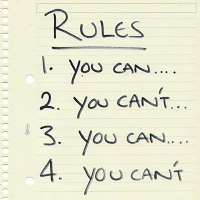On Being Offended: Washington Obscenities, Barilla, Klosterman, Cohen
Here’s my principle on language and offense:
You do not get to decide whether I should be offended by something you do or say; you only get to decide whether you care.
Here’s what I mean. Someone uses language I find offensive. I call them on it. They cannot decide for me whether it’s ok that I am offended. They can try to persuade me that it’s not offensive. They can try to persuade me that I have misunderstood. I can try to persuade them that they have not thought through their language. And so forth. But at the end of the day, if I am offended, I am offended.
And if they don’t care, then they don’t care. It’s my job to make them care.
I mostly write about language and offense in the context of intellectual disability. When I hear people use the r-word, it’s mostly in the context of themselves or someone they know without a disability. “Those <insert political opponents> are a bunch of _________.” “I felt like such a _______ when I failed that test.” But I’ve been thinking about this principle broadly for the last few weeks as I’ve pondered a few different case.
1. Take the Washington football team. Dan Snyder, the owner, says that the R-word name (different r-word) has a proud tradition, some Natives don’t mind, and that no offense is intended. Well, first of all he’s wrong about Native American groups. The survey he cites has flawed methodology. Some of the quotes in support of the racial epithet turned out to be misquotes. And so forth. At any rate, I am offended by this obscenity. I get to decide whether I’m offended. Snyder gets to decide whether he cares, and so far, he doesn’t. It will take financial pressure to change things.
2. Take Barilla. When the CEO made homophobic (and later sexist) statements, people were offended. He, or at least the company’s PR people, decided that they cared and quickly apologized. Now they are making more inclusive ad campaigns. It’s true that when people called out the CEO, lots of voices tried to argue that he wasn’t being offensive, he was just expressing his support for one kind of family over another. But again, I was offended, and he doesn’t get to decide whether that’s fair.
3. Take Chuck Klosterman, ethicist for the New York Times. A blogger and mother of a child with Down Syndrome, who blogs at atypicalson.com, called him out for repeated use of the r-word and other pejoratives about intellectual disability. After a few days, Klosterman replied to the author:
I should not have used “retard” pejoratively. It was immature,
hurtful, and thoughtless. I have no justification for my actions. I
realize the books that contain those sentiments were published over 10
years ago, but that is no excuse; I was an adult when I wrote them and I
knew what I was doing. I feel terrible about this and deeply
embarrassed. I take full responsibility for my actions and understand
why this matters so much to you. I’m truly sorry.
Feel free to re-post this message on your web site. I deserve the
criticism I am receiving, and I want other people to know that I realize
I was wrong. I would also like to donate $25,000 to whatever charity
you feel is most critical in improving the lives of people with
cognitive disabilities . . . I have done something bad, so help me do something good.
What’s so impressive about this response is that he didn’t go to the usual dodge. He didn’t say that he meant no offense, that he wasn’t talking about people with Down syndrome, or deny that it was offensive. He simply apologized and tried to make appropriate restitution. And just as I wrote about with Barilla, it’s now our job to trust, but verify – allow him an out, let him make the apology, but keep an eye on things going forward. I’m really pleased by how this story turned out.
4. Richard Cohen, columnist for the Washington Post, wrote a racist and offensive column yesterday (it was about how Chris Christie was awesome but was going to have trouble winning the GOP nomination, because he didn’t block gay marriage). He tried to pretend it wasn’t racist by writing such lines as “Today’s GOP is not racist” and using the phrase “conventional views” instead of retrograde racists, but, again, he doesn’t get to decide whether I’m offended, only if he cares. Here’s the widely-quoted paragraph.
Today’s GOP is not racist, as Harry Belafonte alleged about the tea
party, but it is deeply troubled — about the expansion of government,
about immigration, about secularism, about the mainstreaming of what
used to be the avant-garde. People with conventional views must repress a
gag reflex when considering the mayor-elect of New York — a white man
married to a black woman and with two biracial children. (Should I
mention that Bill de Blasio’s wife, Chirlane McCray, used to be a
lesbian?) This family represents the cultural changes that have
enveloped parts — but not all — of America. To cultural conservatives,
this doesn’t look like their country at all.
So people with conventional views gag when seeing an interracial couple according to Richard Cohen. Here’s his response to the outrage.
“The word racist is truly hurtful,” he told The Huffington Post on
Tuesday. “It’s not who I am. It’s not who I ever was. It’s just not
fair. It’s just not right.”
I don’t know whether he’s a racist. But what he wrote was racist (and homophobic). He doesn’t get to decide whether I find it offensive, he just gets to decide if he cares.
Just compare Cohen to Klosterman in their response to discovering people are offended. Klosterman owns it and writes a careful apologetic letter linked to specific action to make restitution. Cohen decides to be offended that we are offended.
Well, Cohen gets to be offended at the widespread offense taken to his column. We just don’t have to care.

